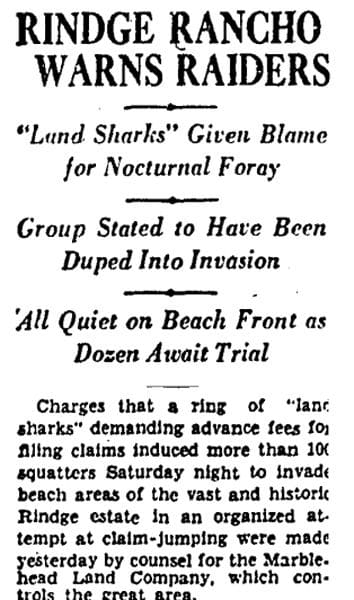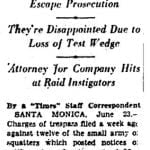Plus ça change, plus c’est la même chose, as the French say.The more it changes, the more it stays the same. You think Malibu has a problem with squatters and homeless and Bedouin RV campers now? May Rindge dealt with the same problem in 1930.
Almost 100 years ago, real estate dealers could be unscrupulous—believe it or not—and some underhanded agents in Los Angeles persuaded gullible, desperate, Depression-addled citizens that the Rindge claim on some or all of the 13,300-acre Malibu Rancho was illegal—especially oceanfront property—and all they had to do was march up the coast and claim their piece of paradise by planting a stake in the ground (and, symbolically, through the heart of May Rindge).
This all happened seven months after the stock market crashed in October 1929. David K. Randall summed up the temper of the times in his most-excellent book “The King and Queen of Malibu”:
“Families shuffling along the lines for soup kitchens searched for someone or something to give them a glimmer of hope. All those untouched hills of Malibu, just on the other side of the fences, provided a target too tempting to resist. In June 1930, nine months after the crash, an army of more than one hundred squatters tore down the barbed wire lining the Roosevelt Highway and raced onto the Malibu ranch. Each of them carried a typewritten piece of paper stating that, as Malibu had once been a Spanish land grant, Rindge had illegally taken land that should have been set aside for homesteading and they were now here to reserve a plot.”
But the whole scheme was a scam. By 1923, May Rindge’s claim to the land had been thoroughly defended in courts from the county to the state to the U.S. Supreme Court level. All 13,300-plus acres belonged to the Rindge family, from County Line to Las Flores Creek, tidepools to mountain tops—lock, stock and lobsters—and while the supreme court had deemed it lawful to run a county road and then a federal highway through the property, no one had the right to show up with a stake and claim the land for themselves. The land belonged to the Rindges.
It was a real estate scam and the LA Times said as much on June 17, 1930, under the title “RINDGE RANCHO WARNS RAIDERS.”
Around 136 gullible citizens had paid $2,500 each—$38,084 in 2019 = righteous bucks!—to sharky real estate agents who gave them pieces of paper that proved to be valueless. These citizens showed up and bust through the gates with pitchforks and lanterns and it almost got ugly.
David K. Randall summed up the response in “King and Queen of Malibu”:
“May’s foreman led armed guards on horseback to meet them in the ranch canyons and, hoping to avoid a shootout, placed a call of the sheriff’s office. A truck carrying a team of policemen arrived shortly after three in the morning carrying tear gas and a sheaf of warrants. Twelve squatters were arrested, including four husband-and-wife pairs. It was soon revealed that all one hundred members of the invading army each paid $2,500 to a lawyer who’d promised that he could successfully challenge May’s title to the property, a position that the registrar of the General Land Office called foolhardy to the extreme.”
But the Marblehead Land Company—controlled by Mrs. Rindge—proved to be full of the milk of human kindness—or perhaps they didn’t want to be distracted by suing a mob of gullible squatters. On June 24, 1930, the LA Times reported all charges had been dropped. These people had all been swindled out of a lot of money and the real fault lay with the real estate sharks.
It was never reported what happened to the real estate land sharks. That invasion of squatters and crashers passed like a quick snow flurry of trouble, but the 1930s were just getting started for May Rindge–and they were the beginning of the end for the Rindge dynasty in the Malibu Rancho.The following year was a true annus horriblis for May Rindge: Malibu Pottery burned and the agent handling the sale of La Costa was indicted, convicted and went to prison.
Ten years later, May Rindge would pass on, almost penniless.
For the full version of this story, go to benmarcusrules.com.


